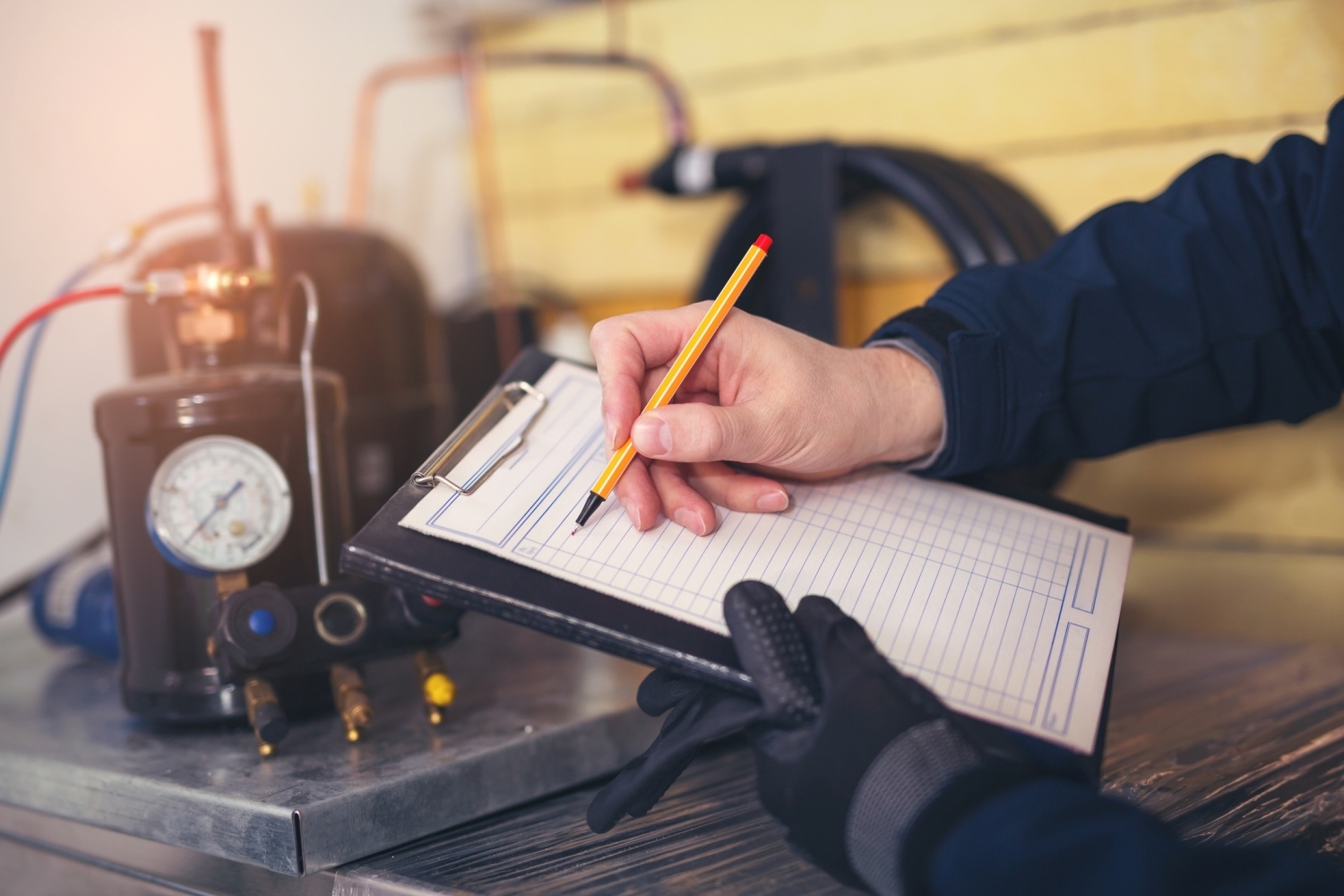How Often Should I Have My AC Unit Inspected?

With warmer weather almost upon us, you might be wondering if it is necessary to have your air conditioning unit checked. Even if your air conditioning unit seems to be working correctly, it is recommended by HVAC manufacturers to have it inspected at least once per year, according to heating and cooling experts. Regular inspections will ensure that it operates at its most efficient level and is working when you need it most.
Having your air conditioning inspected helps keep your system running smoothly and ensure that it operates at its most efficient level. It will also prolong the life of your HVAC system. Similar to a car, if you don’t take good care of your A/C system, it will not as long as it should.
Who Should Perform an HVAC Inspection?
Trained HVAC professional contractors should perform air conditioning inspections and maintenance. There are a few things that homeowners can do themselves, such as changing the filter and removing leaves from around the outside unit, but for the most part, A/C inspections should be left to the pros.
What Is Usually Included in an Air Conditioner Inspection?
An air conditioner inspection carried out by an an HVAC maintenance professional is crucial for maintaining optimal performance and efficiency. Here’s a comprehensive checklist of tasks typically included in an AC inspection:
1. Change Air Filters and Clean Ducts
-
Regularly change air filters to ensure clean airflow.
-
Clean air ducts to prevent oversaturated filters and reduce efficiency.
2. Inspect HVAC System Thermostat Settings
-
Verify that the thermostat settings match the desired temperature output.
3. Lubricate All Moving Parts
-
Confirm that all moving parts (such as fans and motors) are sufficiently lubricated to reduce friction and wear.
4. Clean AC System Evaporator and Condenser Coils
-
Dirty coils can reduce cooling efficiency. Clean both the evaporator and condenser coils.
-
Ensure the condenser coil and evaporator coil are free from debris.
5. Inspect Blower Assembly and Belts
-
Check the blower assembly for proper functioning.
-
Inspect belts for wear and tightness.
6. Check for Refrigerant Leaks
-
Inspect lines for visible refrigerant leaks.
-
Verify that superheat and subcooling levels are correct.
7. Inspect Drain Components
-
Check the condensate drain pan for damage.
-
Inspect the drain line for any blockages.
8. Verify Electrical Connections and Voltage
-
Tighten any loose electrical connections.
-
Ensure that all equipment operates at the correct voltage.
9. Monitor Suction and Discharge Pressure
-
Inspect the suction and discharge pressure levels.
10. Ensure Proper Thermostat Sensors
-
Verify that thermostat sensors are working correctly.
11. Note Any Necessary Repairs
-
Document any repair work needed based on the inspection.
These are just a few of the things that a professional air conditioning contractor will inspect. Air conditioning inspections and preventative maintenance can vary from company to company.
Remember that routine preventive maintenance helps prolong equipment life, improves system efficiency, and reduces utility costs. Regular AC inspections are essential for keeping your air conditioning unit running smoothly and avoiding unexpected issues.
Frequently Asked Questions About AC Inspection Frequency
Maintaining a comfortable and healthy home environment is essential, and your air conditioning system plays a pivotal role in this. Regular AC inspections are crucial for ensuring that your unit operates efficiently, lasts longer, and keeps your energy bills in check.
Below, we’ve compiled a list of the most frequently asked questions regarding the frequency of AC inspections. These FAQs aim to guide homeowners on how to best care for their cooling systems and highlight the importance of routine maintenance.
How often should I have my air conditioner serviced?
-
It is generally recommended to service your AC at least once per year, ideally in the spring.
-
If your AC unit is 10 years or older, consider scheduling twice-yearly inspections to catch potential problems early and extend the system’s lifespan, which is typically around 15 years.
What factors affect the frequency of AC inspections?
-
Climate: If you live in an area with extreme temperatures or high humidity levels, more frequent inspections may be necessary due to additional strain on the unit.
-
Usage: If you rely heavily on your AC throughout the year, consider scheduling inspections more frequently.
-
Manufacturer Recommendations: Consult your AC system’s user manual or contact the manufacturer directly for their specific recommended inspection schedule.
What are the benefits of more frequent inspections?
-
System Reliability: Frequent inspections enhance system reliability by identifying issues early.
-
Indoor Air Quality: Regular inspections contribute to improved indoor air quality.
-
Energy Efficiency: Keeping your AC well-maintained minimizes energy waste and ensures a comfortable living environment.
Stay Cool: Fast AC Inspection and Repair Services in North Houston
Step into the future and maintain your ideal summer AC temperature with a dependable HVAC system and regular maintenance services from ACTexas. We are dedicated to providing excellent service, fair pricing, and swift response times, ensuring that you won’t have to endure days of discomfort due to emergency repairs.
We recognize the urgency of a malfunctioning air conditioner in Texas, and we often arrange same-day appointments to address the issue promptly. Whether your AC unit refuses to start or emits unusual noises, our AC repair team is ready to assist.
Choose ACTexas as your trusted AC company in the northern Houston communities. To schedule residential or commercial AC repair services, give us a call at (281) 355-1500.
Looking for air conditioning service or air cleaners? Contact the team at ACTexas today!

 265 Customer Reviews
265 Customer Reviews